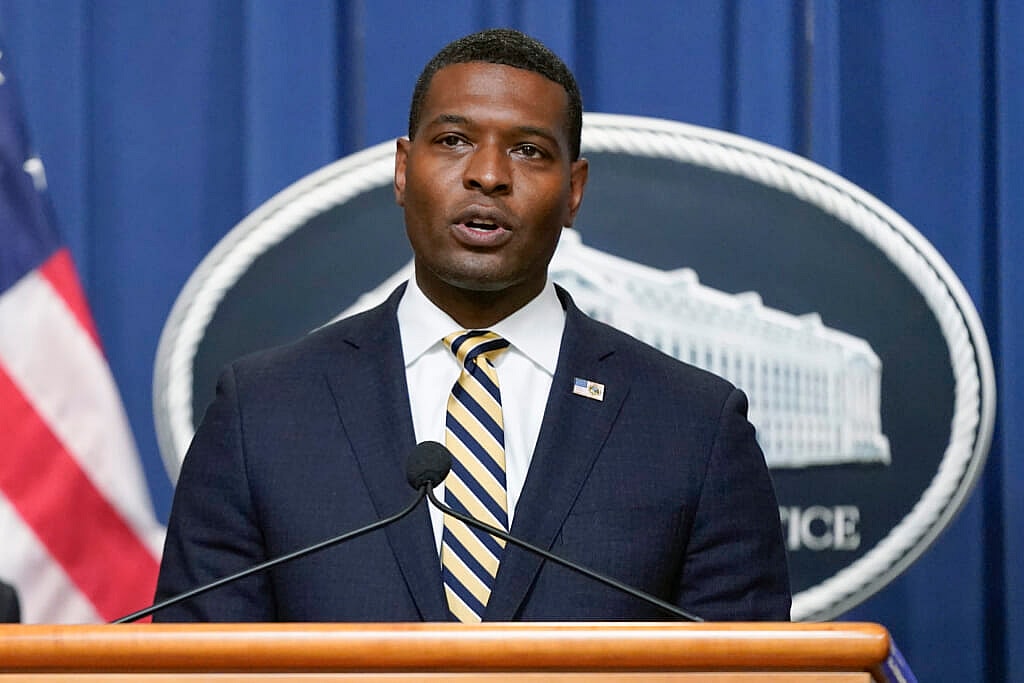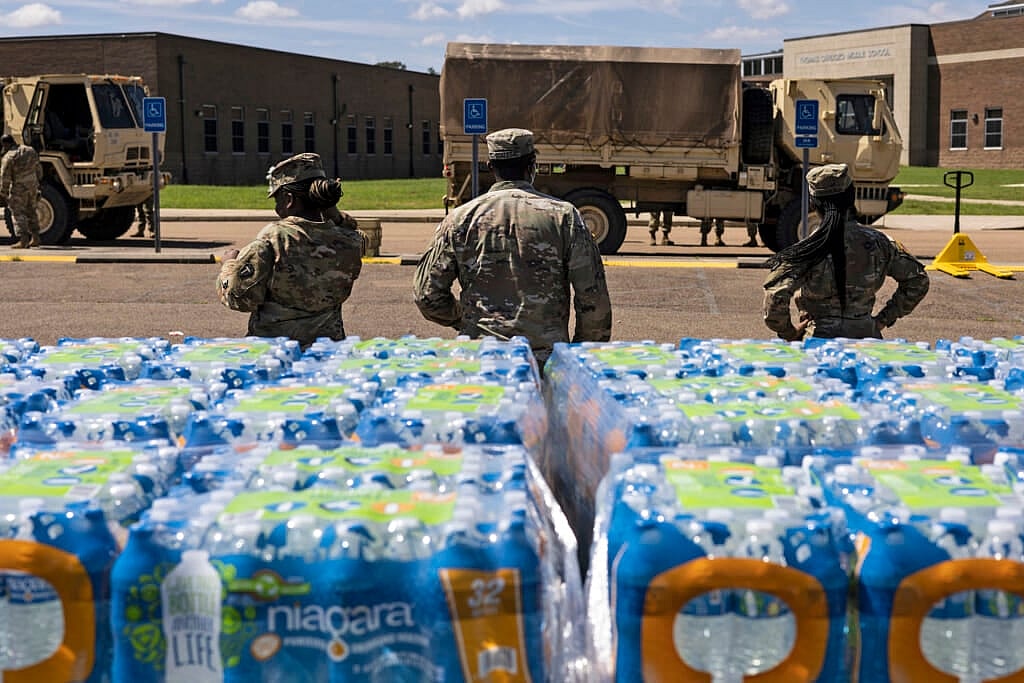Water is Earth’s most essential resource, yet access to it has been historically elusive for many Black and brown communities across the United States.
“If you cannot wake up in the wealthiest country in the history of the world and turn your faucet on and be able to use that water to cook, to drink, brush your teeth in … that is something we should never have to fathom with the amount of money that we have,” said Baltimore Mayor Brandon Scott during a recent interview with theGrio.

Scott governs one of the nation’s oldest water systems in the U.S. and recently led Baltimore through a short-lived emergency involving E. coli contamination in the city’s water. While city officials were able to treat the water and end a days-long boiled water advisory, what happened in Baltimore is emblematic of a larger issue happening in many predominantly Black and brown neighborhoods throughout the country.
Days before Baltimore announced that part of its city water tested positive for E. coli, most of the national attention was on Jackson, Mississippi. There, the predominantly Black city grappled with its own, larger crisis that left more than 150,000 residents without clean and safe water as a result of both the effects of climate change and an aging water system. The impact of unusually heavy rainfall in Mississippi’s capital caused flooding and an overflow at its local water plant, already in great need of repair.
The crisis prompted a federal emergency declaration by President Joe Biden and visits from Biden-Harris administration officials, among them Deanne Criswell, administrator of the Federal Emergency Management Agency, and Environmental Protection Agency Administrator Michael Regan.
Regan sat down with Jackson Mayor Chokwe Lumumba and Mississippi Gov. Tate Reeves after the two leaders publicly blamed each other for Jackson’s water crisis. Their joint meeting eventually led to all leaders vowing to do whatever is necessary on the federal, state and local levels to ensure that Jackson’s water system gets the repair funding it needs. Mayor Lumumba estimated the price tag to be as much as $1 billion.
Whether in Jackson, Baltimore, or Flint, Michigan — which became the poster child for environmental justice after the city was left crippled by lead contamination in its water in 2014 — there is a common thread of underinvestment over the years in majority-Black zip codes.
“There is no question that Black and brown communities disproportionately suffer from a lack of access to clean safe water, more so than white communities,” EPA Assistant Administrator Radhika Fox, who runs the agency’s water office, told theGrio. “There are a lot of factors that have led to this, but underinvestment is a huge problem.”
President Biden and EPA Administrator Regan, she said, share “a deep commitment to environmental justice and equity,” adding, “we are working hard to make sure that all communities get their fair share.”

Fox said the EPA is providing technical assistance to disadvantaged communities so they can access federal funding from the Bipartisan Infrastructure Law signed by President Biden last year, which allocated $50 billion for water infrastructure improvement. However, states will have to apply for those dollars on behalf of their cities and towns. In the case of Mississippi, Regan — whose agency would have to approve any application for environmental infrastructure projects — committed to ensuring that a significant portion of the $400 million available goes to Jackson.
In a statement to theGrio, Regan recalled meeting with Jackson residents, including a 98-year-old woman, Ollie Mae Anderson, who had to rely on bottled water to brush her teeth and bathe. “This is unacceptable in the United States of America,” he said. “The people of Jackson — like all people in this country — deserve access to clean and safe water. EPA will continue to work with city and state officials to make that a reality.”
Leaders like Mayor Scott in Baltimore say federal investment from Biden’s infrastructure law is long overdue. “Infrastructure has been ignored in what we call legacy cities for far, far too long … especially in cities where much of this infrastructure was built with federal assistance,” said Scott. The 38-year-old mayor — who said that growing up in Baltimore, the water not being safe to drink was commonplace — described the soon-to-come federal funding as “heaven sent.”
“It is the most significant assistance that cities have received in generations,” said Scott. “No, this alone will not solve the infrastructure issues for Baltimore or any other city, but when you’re talking about decades of neglect and decades of mis- and disinvestment, you have to have a significant starting point.”
U.S. Rep. Kweisi Mfume (D-Md.), who sits on the House Oversight and Reform Committee, noted that “this country was built during the industrial age.” He told theGrio, “Many of the underground systems that are in place are extremely old. Some go back to the early 1900s. Whether it’s Baltimore, Maryland, or Jackson, Mississippi, or Flint, Michigan … underserved communities are the first to feel the pinch and the pain of aging infrastructure.”

The road to fixing America’s aging water infrastructure is underway in some affected communities, but it is also a long one. For example, despite multimillion-dollar settlements on behalf of the residents in Flint, thousands of lead pipes have yet to be replaced more than eight years after its nationally publicized water crisis.
Flint has become a cautionary tale for many cities as its water crisis led to a judge issuing a more than $625 million settlement and several state officials being indicted on criminal charges, though prosecutions have since been upended by a Michigan Supreme Court ruling earlier this year.
Melissa Mays, an organizer for the advocacy group Flint Rising, told theGrio that though more than 10,000 lead pipes have been replaced in Flint by court order, residents continue to deal with bacterial outbreaks and occasional water shortages. Despite paying high water bills, Mays said the people of Flint still filter their water and boil it before usage.
“For a lot of people, it’s exhausting, so they’re still going and buying bottled water on top of paying our water bills,” explained Mays, who said water bills cost as much as $150. “People are still showering obviously in it, and you get rashes, hairs falling out, the smell is terrible. I have people on the daily that are sending me videos and photos of discolored water.”
“It’s like 2015 all over again,” she added, “and for some people, it never went away.”
Mays, who was a plaintiff on behalf of her children in the Flint settlement case, said that federal, state and local leaders must make sure that any money coming from the infrastructure law is actually going to communities in need.

“They have to make sure this isn’t going to be like another PPP loan disaster, where the wealthy folks got it, even though they can afford to have the lines replaced, and make sure it goes to communities who cannot afford to take out these State Revolving Fund loans and to make sure that more debt isn’t taken on and passed on to [residents],” she explained.
Danyelle Holmes, an organizer at Repairers of the Breach in Jackson, told theGrio she is “remorseful” that she did not take the water crisis in Flint as seriously as she needed to now that she and other Jackson residents are experiencing the same plight.
“I took it for granted what they were actually facing,” Holmes said. “In the same way that people are rushing to save Jackson, Mississippi, I should have been one of the very main ones who had boots on the ground going to Flint, Michigan, but it was my ignorance and a lack of knowledge.”
“This has put me on notice not to ever take anyone who is dealing with this kind of crisis for granted,” she added. “Clean water is a basic human right, and we shouldn’t have to argue about it. The earth couldn’t survive without water, how much more so can a human being survive without water?”

Holmes, who recently participated in a virtual rally hosted by the Poor People’s Campaign to give residents of Jackson a platform to share their grievances, said she blames Jackson’s water infrastructure woes on Republican leadership in Mississippi and “extreme racist politics.” She said she is appreciative of the leadership of EPA Administrator Regan, who is Black.
“Regan is not ignorant to what is happening in the Black and brown communities. I don’t think it was really a hard position to take because he’s seen the neglect,” Holmes contended. “He’s seen the disparities amongst Black communities, versus a white affluent community and how they’re funded and how the Black communities are underfunded.”
In Baltimore, Mayor Scott said new federal funding from Washington would not only begin the work of rebuilding infrastructure in some of America’s oldest Black and brown communities, but also “create jobs and opportunity for people that have been left out so that the neighborhood is not only becoming a more sustainable, 21st-century neighborhood … but people who have been locked out in jobs and opportunities are actually able to work on those projects.”
“This is why this is important,” he maintained, “because we’re talking about giving people the basic necessities of life for them to grow into the best version of themselves.”

Gerren Keith Gaynor is the Managing Editor of Politics and Washington Correspondent at theGrio. He is based in Washington, D.C.
TheGrio is FREE on your TV via Apple TV, Amazon Fire, Roku and Android TV. Also, please download theGrio mobile apps today!

